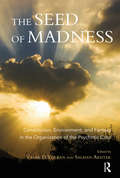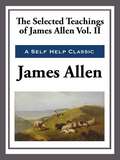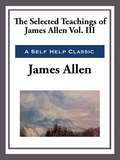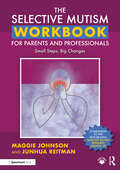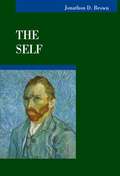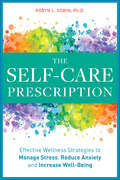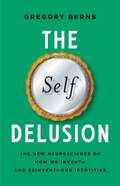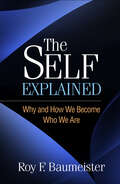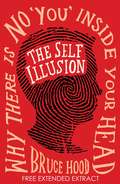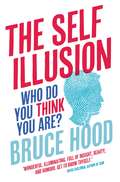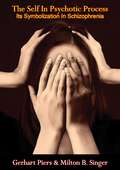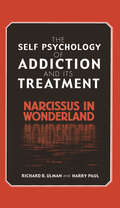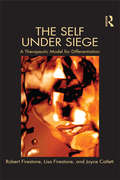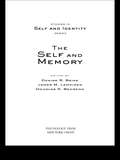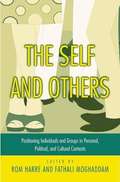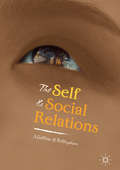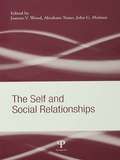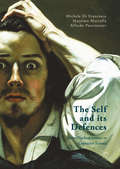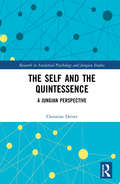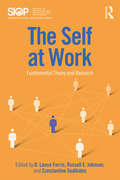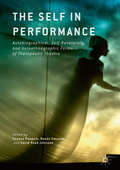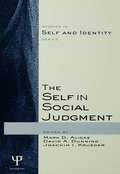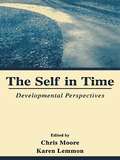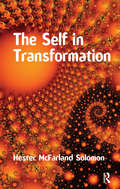- Table View
- List View
The Seed of Madness: Constitution, Environment, and Fantasy in the Organization of the Psychotic Core
by Salman AkhtarMore and more individuals with ego defects, severe object relations conflicts, affective turbulence, and unassimilated contradictions are seeking help from psychoanalysts and psychotherapists. Contributors to this book explore hereditary and constitutional factors, environmental influences and unconscious fantasies in the development of the psychotic core in such patients and provide guidance for psychoanalysts and psychotherapists to hear and therapeutically respond to these patients' uncanny ways of describing their internal worlds. This volume includes contributions by experienced clinicians from Europe and the United States, as well as case histories illustrating the transformation of the psychotic core and how these patients can develop healthier internal structures. The editors' introductory and closing summaries integrate knowledge dealing with especially difficult patients. By reading this book, psychoanalysts and therapists will be prepared to gain insights as newer neurobiological and psychological research findings become available and, hopefully, enthusiasm about working with individuals with "the seed of madness."
The Selected Teachings of James Allen Volume II
by James AllenJames Allen was one of our finest thinkers. In this 4 - in - 1 omnibus edition Allen show's you the power of positive thinking and a path to prosperity with dignity. These teachings are as timeless today as they were when they were written. Many of today's best sellers, such as The Power of Positive Thinking, Laws of Attraction, and The Science of Success, and The Secret owe a deep and abiding debt to these great works. Now you can read the words of the master. This edition includes: Eight Pillars of Prosperity Foundation Stones to Happiness and Success, The Shining Gateway, James Allen's Book of Meditations for Every Day in the Year
The Selected Teachings of James Allen Volume III
by James AllenJames Allen was one of our finest thinkers. In this 4 - in - 1 omnibus edition Allen show's you the power of positive thinking and a path to prosperity with dignity. These teachings are as timeless today as they were when they were written. Many of today's best sellers, such as The Power of Positive Thinking, Laws of Attraction, and The Science of Success, and The Secret owe a deep and abiding debt to these great works. Now you can read the words of the master. This edition includes: The Mastery of Destiny; As a Man Does: Morning and Evening Thoughts; Man: King of Mind, Body, and Circumstance; Out from the Heart; Men and Systems.
The Selective Mutism Workbook for Parents and Professionals: Small Steps, Big Changes
by Maggie Johnson Junhua ReitmanThis workbook provides hands-on Activities, Strategies, planning sheets and progress trackers for use with children with selective mutism at home, at school and in the wider community. Written by selective mutism expert Maggie Johnson and parent coach Junhua Reitman, the workbook includes first-hand accounts of how children can overcome SM successfully using the Activities and Strategies described in this book. Activities are organised around the daily routines of school and family life and each Activity is broken into a progression of small steps with appropriate Strategies and an accompanying record sheet to track progress. Activities include: • Using the toilet at school • Attending social gatherings • Organising a successful playdate • Initiating conversation • Talking in the classroom • Eating with peers This workbook is essential reading for parents, professionals and anyone who is looking for a toolkit for selective mutism. It also provides a useful extension to The Selective Mutism Resource Manual, 2nd edition, focusing on the ‘how’ to complement the manual’s ‘what’ and ‘why’. Small steps really do lead to big changes but taking the first step can be the most difficult. This book helps you make that first step.
The Self
by Jonathon BrownAlthough social psychology has been traditionally focused on interpersonal relationships, the cognitive revolution in psychology has had the effect of refocusing some social psychology on intra-psychic processes. This area of psychology has become very popular in recent years, yet there is currently no other textbook available for the study of the self. Republished in its original form by Psychology Press in 2007, this book carefully documents the changing conceptions and the value accorded the self in psychology over time. It further outlines the many alternative conceptions of this increasingly central domain in social psychology. New research and conceptions are juxtaposed with the classic and traditional, providing the reader with a comprehensive introduction to the study of the self.
The Self Care Prescription: Effective Wellness Strategies to Manage Stress, Reduce Anxiety, and Increase Well-Being (Self-Care Prescription)
by Robyn GobinImprove your well-being every day with solutions-based, self-care strategies that work.Picture your best life: Where would you work? What would your social calendar look like? What personal interests would you be exploring? This book is your prescription to turn those visions into a reality—with proven self care strategies for every area of your life.The Self Care Prescription empowers you to find balance and purpose in your relationships, work, and life. From creating a plan to spend more time with family and friends, to zeroing-in on a career that you can feel good about, the book will help you create a personalized self care plan. You'll also learn actionable techniques to fight anxiety, demotivation, or whatever else is holding you back from building the life you want to live.The Self Care Prescription includes:Self care 101—Learn what "self care" really means, and how you can start practicing it every day.A full-spectrum plan—Bring self care to the physical, spiritual, emotional, intellectual, vocational, and social areas of your life.Best-life strategies—Unwind with mindfulness breathing practices or start eating right with healthy meal planning—you'll find tons of actionable self care techniques to help you reach your goals.Be the friend you want to be to yourself and others. Be engaged with what you do. Whatever self care means to you, you'll find your own personal practice in this book.
The Self Delusion: The New Neuroscience of How We Invent—and Reinvent—Our Identities
by Gregory BernsA New York Times–bestselling author reveals how the stories we tell ourselves, about ourselves, are critical to our lives We all know we tell stories about ourselves. But as psychiatrist and neuroscientist Gregory Berns argues in The Self Delusion, we don&’t just tell stories; we are the stories. Our self-identities are fleeting phenomena, continually reborn as our conscious minds receive, filter, or act on incoming information from the world and our memories. Drawing on new research in neuroscience, social science, and psychiatry, Berns shows how our stories and our self-identities are temporary and therefore ever changing. Berns shows how we can embrace the delusion of a singular self to make our lives better, offering a plan not centered on what we think will be best for us, but predicated on minimizing regrets. Enlightening, empowering, and surprising, The Self Delusion shows us how to be the protagonist of the stories we want to tell.
The Self Explained: Why and How We Become Who We Are
by Roy F. BaumeisterThe idea of the self is immediately familiar to everyone, yet elusive to define and understand. From pioneering researcher Roy F. Baumeister, this volume synthesizes a vast body of knowledge to provide a panoramic view of the human self--how it develops and functions, why it exists, and what problems it encounters on the journey through life. What are the benefits of self-knowledge, and how attainable is it? Do we have one self, or many? What is the relationship of self and society? In 28 concise chapters, Baumeister explains complex concepts with clarity and insight. He reveals the central role played by the self in enabling both individuals and cultures to thrive.
The Self Illusion (Extract): Why There is No 'You' Inside Your Head
by Bruce HoodThis is an extended extract from The Self Illusion: Why There is No 'You' Inside Your Head.Most of us believe that we possess a self - an internal individual who resides inside our bodies, making decisions, authoring actions and possessing free will. The feeling that a single, unified, enduring self inhabits the body - the 'me' inside me - is compelling and inescapable. This is how we interact as a social animal and judge each other's actions and deeds. But that sovereignty of the self is increasingly under threat from science as our understanding of the brain advances. Rather than a single entity, the self is really a constellation of mechanisms and experiences that create the illusion of the internal you.We only emerge as a product of those around us as part of the different storylines we inhabit from the cot to the grave. It is an every changing character, created by the brain to provide a coherent interface between the multitude of internal processes and the external world demands that require different selves.
The Self Illusion: Why There is No 'You' Inside Your Head
by Bruce HoodMost of us believe that we possess a self - an internal individual who resides inside our bodies, making decisions, authoring actions and possessing free will. The feeling that a single, unified, enduring self inhabits the body - the 'me' inside me - is compelling and inescapable. This is how we interact as a social animal and judge each other's actions and deeds. But that sovereignty of the self is increasingly under threat from science as our understanding of the brain advances. Rather than a single entity, the self is really a constellation of mechanisms and experiences that create the illusion of the internal you.We only emerge as a product of those around us as part of the different storylines we inhabit from the cot to the grave. It is an ever changing character, created by the brain to provide a coherent interface between the multitude of internal processes and the external world demands that require different selves.
The Self In Psychotic Process: Its Symbolization In Schizophrenia
by C. G. Jung John Weir PerryC.G. Jung started as a psychiatric learning from schizophrenic patients. Among the Jungian school, only John Weir Perry has continued this line of Jung's work with such depth of understanding, clinical acumen, and the ability to write beautifully. Perry's therapy in the California Bay Area with acute episodes in young psychotic patients brought him national and international renown. The case of the young housewife diagnosed catatonic schizophrenic demonstrates the interpenetration of collective symbols and individual processes as they come to light in 'breakdown' (Part One), and extends knowledge of the psyche by elucidating symbols of the Self (Part Two).-Print ed.
The Self Psychology of Addiction and its Treatment: Narcissus in Wonderland
by Harry Paul Richard B. UlmanIn the time of Freud, the typical psychoanalytic patient was afflicted with neurotic disorders; however, the modern-day psychotherapy patient often suffers instead from a variety of addictive disorders. As the treatment of neurotic disorders based on unconscious conflicts cannot be applied to treatment of addictive disorders, psychoanalysis has been unable to keep pace with the changes in the type of patient seeking help. To address the shift and respond to contemporary patients’ needs, Ulman and Paul present a thorough discussion of addiction that studies and analyzes treatment options. Their honest and unique work provides new ideas that will help gain access to the fantasy worlds of addicted patients. The Self Psychology of Addiction and Its Treatment emphasizes clinical approaches in the treatment of challenging narcissistic patients struggling with the five major forms of addiction. Ulman and Paul focus on six specific case studies that are illustrative of the five forms of addiction. They use the representative subjects to develop a self psychological model that helps to answer the pertinent questions regarding the origins and pathway of addiction. This comprehensive book links addiction and trauma in an original manner that creates a greater understanding of addiction and its foundations than any clinical or theoretical model to date.
The Self Under Siege: A Therapeutic Model for Differentiation
by Robert W. Firestone Joyce Catlett Lisa FirestoneHow much of our identity or 'self' is truly representative of our own wants, needs, and goals in life and how much does it reflect the desires and priorities of someone else? Are we following our own destiny or are we unconsciously repeating the lives of our parents, living according to their values, ideals, and beliefs? In this thought-provoking book, noted clinical psychologist Robert Firestone and his co-authors explore the struggle that all of us face in striving to retain a sense of ourselves as unique individuals. The self is under siege from several sources: primarily pain and rejection in the developmental years, problems in relationships, detrimental societal forces, and existential realities that affect all people. Through numerous case studies and personal stories from men and women who participated in a 35-year observational study, the authors illustrate how voice therapy, a cognitive/affective/behavioral methodology pioneered by Firestone, is used to elicit, identify, and challenge the destructive inner voice and to change aversive behaviors based on its prescriptions. The theory they describe integrates the psychodynamic and existential approaches underlying voice therapy and is enriched by research findings in the neurosciences, attachment research, and terror management theory (TMT). An important addition to the area of personality development theory, The Self under Siege offers a new perspective on differentiation and the battle to separate ourselves from the chains of the past. It provides psychotherapists and other mental health professionals with the tools needed to help clients differentiate from the dysfunctional attitudes and toxic personality traits of their parents, other family members, and harmful societal influences that have unconsciously dominated their lives. This book will have a special appeal to clients and, in fact, to any person interested in his/her own personal development
The Self and Memory (Studies in Self and Identity)
by Douglas A. Behrend Denise R. Beike James M. LampinenNoted scholars from a broad range of sub-disciplines in psychology discuss the ways in which the memories of our lives come to influence who we are, our personalities, and our emotional functioning. Other topics covered include how our personalities and self-concepts influence what we remember from our lives, and the notion of memory and the self as interdependent psychological phenomena.
The Self and Others: Positioning Individuals and Groups in Personal, Political, and Cultural Contexts
by Rom Harre; Fathali Moghaddam<p>This volume focuses on relations between the self and other individuals, the self and groups, and the self and context. Leading scholars in the field of positioning theory present the newest developments from this field on human social relations. The discussion is international, multidisciplinary, and multi-method, aiming to achieve a more dynamic and powerful account of human social relations, and to break disciplinary boundaries. <p>Four features in this work are prominent. The book is culturally oriented and international. There is a push to move across disciplines, particularly across psychology and linguistics, and psychology and microsociology. There is a focus on language and social construction of the world through discourse. Finally, the book represents a multi-method approach that reflects discursive methods.<p>
The Self and Social Relations
by Matthew WhittinghamThis book is concerned with the human individual and her relationship with the communities of which she is a member. It argues against the traditional atomistic view that individuals are essentially independent of the social relations into which they enter, and instead argues for the holistic view that we are essentially social beings who cannot exist apart from normative communities. Matthew Whittingham engages in a sustained exploration and criticism of the classic Western picture of epistemology. He argues instead that communities ground the possibility of our forming a conception of the world and ourselves, that those social relations open up a range of affective responses and forms of action that would otherwise be impossible, they enable us to know and reason about the world, and they make possible the daily struggles for freedom and self-realization that are familiar to us all and find their most powerful expression in major social movements.
The Self and Social Relationships
by John G. Holmes Abraham Tesser Joanne V. WoodAlthough the two major research areas of the "Self" and "Social Relationships" have flourished, they have done so largely independently of each other. More and more research, however, has indicated that relationships shape the nature of the self and identity, and that self-views influence interpersonal processes and the manner in which people navigate their close relationships. The integration of research on self and social relationships has proved a particularly rich one, generating some of the most creative and insightful theories in psychology. The Self and Social Relationships is the first volume that marks, expedites, and defines this exciting new research synthesis. It serves both as a platform for authors to present their latest ideas on the topic and to encourage continued integration in this emerging field. The contributions represent a diverse set of perspectives from social/personality and clinical psychology. Each chapter covers a topic that is central to the study of self and relationships, and presents some of the most exciting research programs in the field. This volume is essential reading for researchers and students in the areas of both self and relationships.
The Self and its Defenses: From Psychodynamics to Cognitive Science
by Massimo Marraffa Alfredo Paternoster Michele Di FrancescoThis book presents a theory of the self whose core principle is that the consciousness of the self is a process of self-representing that runs throughout our life. This process aims primarily at defending the self-conscious subject against the threat of its metaphysical inconsistence. In other words, the self is essentially a repertoire of psychological manoeuvres whose outcome is self-representation aimed at coping with the fundamental fragility of the human subject. This picture of the self differs from both the idealist and the eliminative approaches widely represented in contemporary discussion. Against the idealist approach, this book contends that rather than the self being primitive and logically prior, it is the result of a process of construction that originates in subpersonal unconscious processes. On the other hand, it also rejects the anti-realistic, eliminative argument that, from the non-primary, derivative nature of the self, infers its status as an illusory by-product of real neurobiological events, devoid of any explanatory role.
The Self and the Quintessence: A Jungian Perspective (Research in Analytical Psychology and Jungian Studies)
by Christine DriverThe Self and the Quintessence explores Jung’s work on number symbolism and the alchemical journey and considers how they act as metaphors underpinning theories about the development of the self and individuation. It goes on to consider the implications of these dynamics in terms of the symbol of the quintessence and what this represents psychologically. Initially exploring number symbolism and the way numbers can express dimensionality and emergence, this book explores the theories which underpin Jung’s ideas about the self and its complexity, including the dynamics of opposites, the transcendent function, and the symbol of the quaternity (fourness). The book then explores the symbol of the quintessence from a theoretical and clinical perspective and also in relation to its use in alchemy and physics. It goes on to consider the symbolic and psychological significance of the quintessence in relation to complexity, emergence, individuation, wholeness, truth and the spirit of matter. Extending Jungian ideas to explore the archetypal symbol of the quintessence and its psychological significance, The Self and the Quintessence will be of great interest to Jungian academics, researchers and clinicians, and anyone looking to expand their knowledge and understanding of Jungian psychology.
The Self at Work: Fundamental Theory and Research (SIOP Organizational Frontiers Series)
by D. Lance Ferris Russell E. Johnson Constantine SedikidesThe Self at Work brings researchers in industrial and organizational psychology and organizational behavior together with researchers in social and personality psychology to explore how the self impacts the workplace. Covering topics such as self-efficacy, self-esteem, self-control, power, and identification, each chapter examines how research on the self informs and furthers understanding of organizational topics such as employee engagement, feedback-seeking, and leadership. With their combined expertise, the chapter authors consider how research on the self has influenced management research and practice (and vice-versa), limitations of applying social psychology research in the organizational realm, and future directions for organizational research on the self. This book is a valuable resource for researchers, graduate students, and professionals who are interested in how research on the self can inform industrial/organizational psychology.
The Self in Performance: Autobiographical, Self-Revelatory, and Autoethnographic Forms of Therapeutic Theatre
by Susana Pendzik, Renée Emunah and David Read JohnsonThis book is the first to examine the performance of autobiographical material as a theatrical form, a research subject, and a therapeutic method. Contextualizing personal performance within psychological and theatrical paradigms, the book identifies and explores core concepts, such as the function of the director/therapist throughout the creative process, the role of the audience, and the dramaturgy involved in constructing such performances. It thus provides insights into a range of Autobiographic Therapeutic Performance forms, including Self-Revelatory and Autoethnographic Performance. Addressing issues of identity, memory, authenticity, self-reflection, self-indulgence, and embodied self-representation, the book presents, with both breadth and depth, a look at this fascinating field, gathering contributions by notable professionals around the world. Methods and approaches are illustrated with case examples that range from clients in private practice in California, through students in drama therapy training in the UK, to inmates in Lebanese prisons.
The Self in Social Judgment (Studies in Self and Identity)
by Joachim I. Krueger Mark D. Alicke David A. DunningThe volume begins with a historical overview of the self in social judgment and outlines the major issues. Subsequent chapters, all written by leading experts in their respective areas, identify and elaborate four major themes regarding the self in social judgment:· the role of the self as an information source for evaluating others, or what has been called 'social projection'· the assumption of personal superiority as reflected in the pervasive tendency for people to view their characteristics more favorably than those of others· the role of the self as a comparison standard from or toward which other people's behaviors and attributes are assimilated or contrasted· the relative weight people place on the individual and collective selves in defining their attributes and comparing them to those of other people
The Self in Time: Developmental Perspectives
by Chris Moore Karen LemmonHuman reasoning is marked by an ability to remember one's personal past and to imagine one's future. Together these capacities rely on the notion of a temporally extended self or the self in time. Recent evidence suggests that it is during the preschool period that children first construct this form of self. By about four years of age, children can remember events from their pasts and reconstruct a personal narrative integrating these events. They know that past events in which they participated affect present circumstances. They can also imagine the future and make decisions designed to bring about desirable future events even in the face of competing immediate gratification. This book brings together the leading researchers on these issues and for the first time in literature, illustrates how a unified approach based on the idea of a temporally extended self can integrate these topics.
The Self in Transformation
by Hester McFarland SolomonThis book brings together into one volume a number of articles that the author has written over the past 20 years, and includes a new extended essay written especially for this volume. The chapters, organized into sections, explore theoretical and clinical matters within a Jungian analytical framework, making carefully considered links to a number of psychoanalytical themes and concepts. The book also includes a section on ethics in the consulting room. In her new essay, the author discusses pivotal themes in depth psychology: psychic transformation, synchronicity, and the emergence of complex adaptive systems in relation to the evolution of Jungs theory of the psychoid. She draws from fields of study such as anthropology, neuropsychology, the arts and religion to develop her themes. This is a reasoned integration and demonstration of the developing thought and clinical practice of an established Jungian analyst.
The Self in Understanding and Treating Psychological Disorders
by Michael KyriosThis must-have reference is a unique exploration of how the individual notion of 'self' and related constructs, such as early schemas and attachment styles, impact on psychopathology, psychotherapy processes and treatment outcomes for psychological disorders across DSM-5, such as depression, bipolar and schizophrenia spectrum disorders, anxiety and trauma, eating disorders, obsessive-compulsive and related disorders, autism, personality disorders, gender identity disorder, dementia and somatic problems such as chronic fatigue syndrome. It discusses the role of the concept of self in a wide range of existing theoretical and treatment frameworks, and relates these to real-life clinical issues and treatment implications. Emphasizing the importance of integrating an awareness of self constructs into evidence-based conceptual models, it offers alternative practical intervention techniques, suggesting a new way forward in advancing our understanding of psychological disorders and their treatment.
